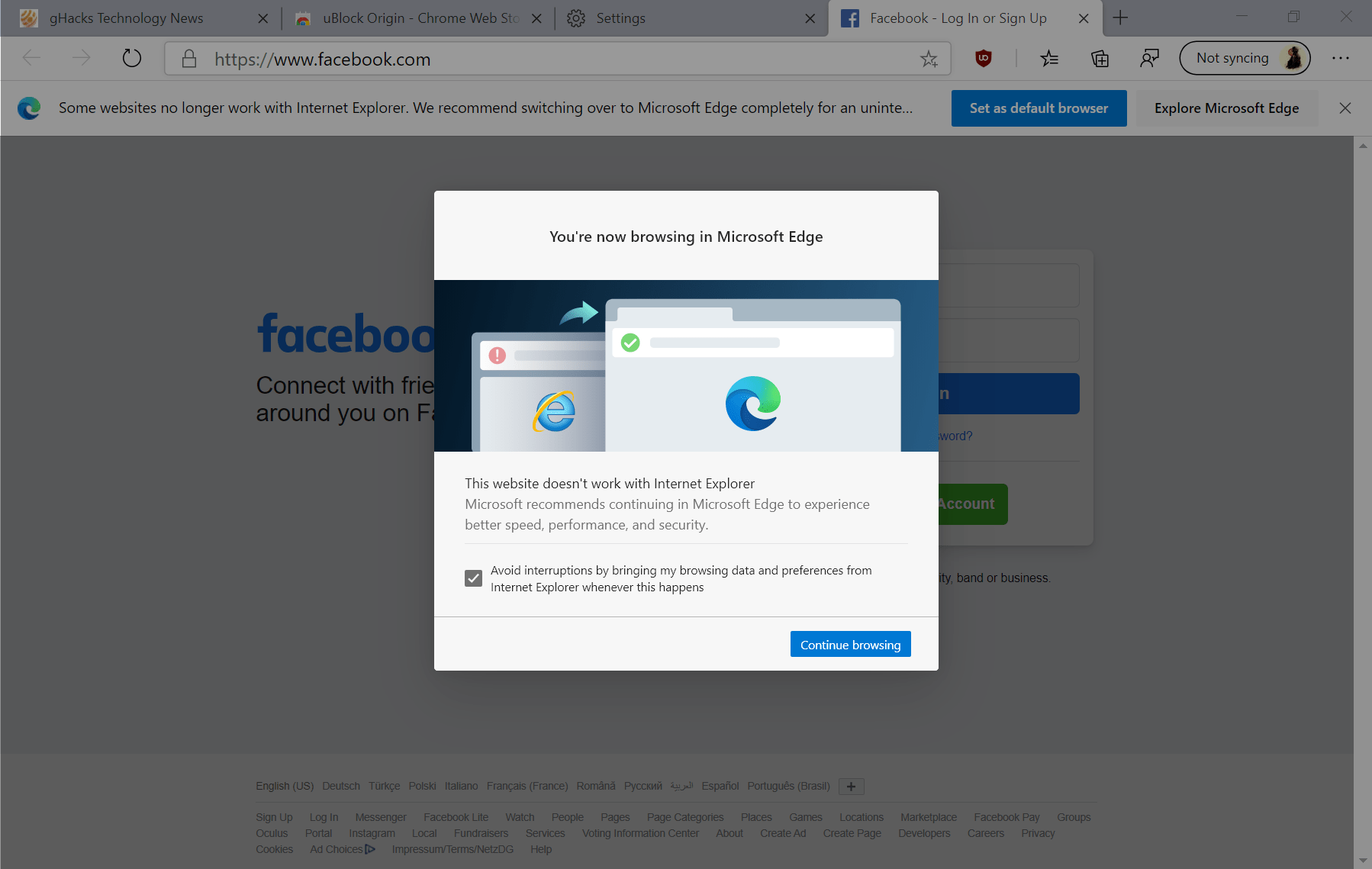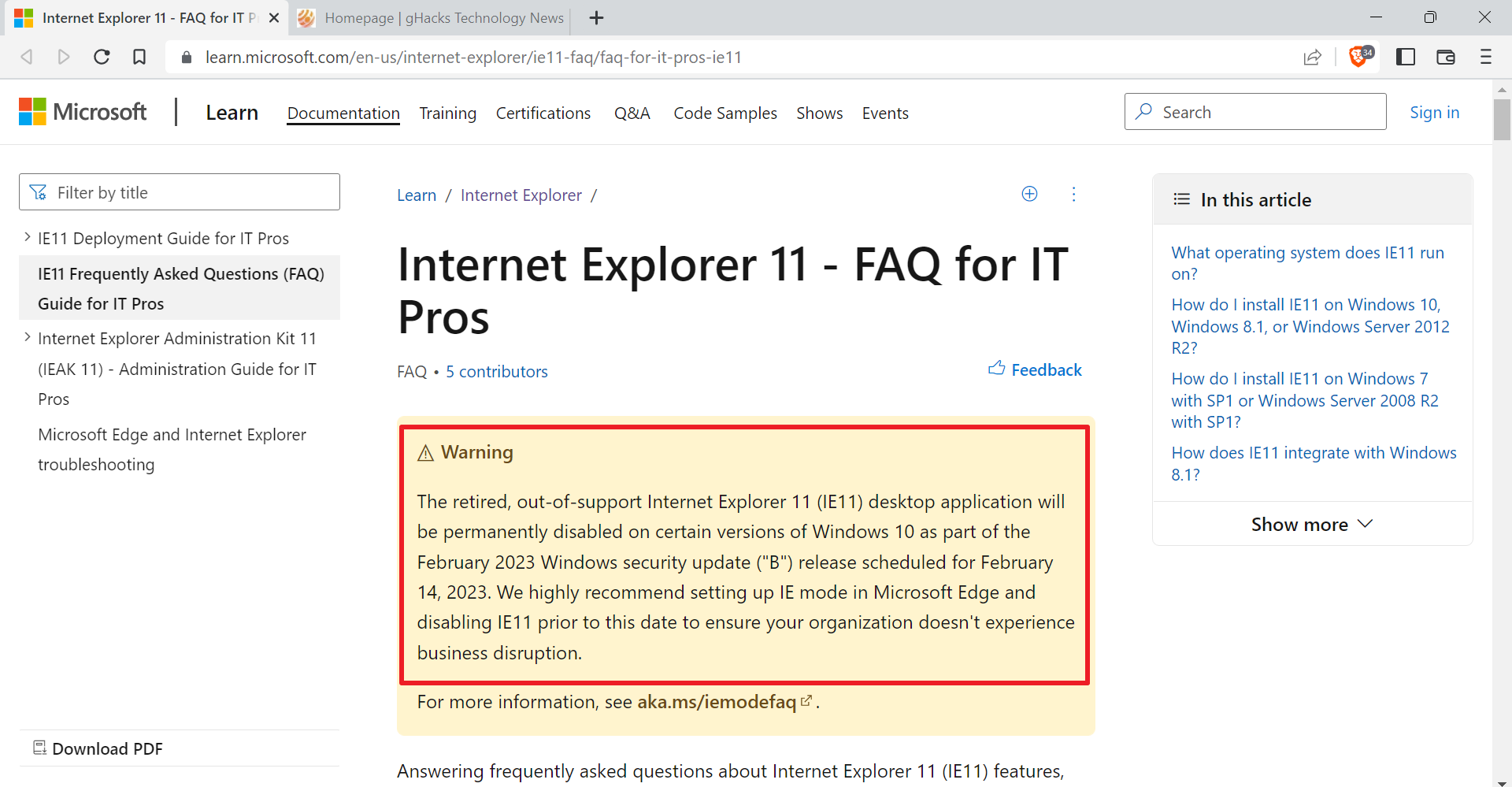End of support for old Internet Explorer versions draws near

Microsoft revealed in 2014 that it plans to end support for older versions of its Internet Explorer web browser starting January 12, 2016.
The company will only support the most recent version of Internet Explorer for supported versions of the Windows operating system, Windows Server and Windows embedded systems from January 2016 on.
Older versions will no longer receive technical support or security updates once the new policy goes live in January 2016
Internet Explorer supported versions as of January 12, 2016
The Life Cycle of Internet Explorer for all supported operating systems is listed on Microsoft's Lifecycle website.
| Operating System | Internet Explorer Version |
| Windows Vista SP2 | Internet Explorer 9 |
| Windows 7 | Internet Explorer 11 |
| Windows 8.1 | Internet Explorer 11 |
| Windows 10 | Internet Explorer 11 |
| Windows Server 2008 SP | Internet Explorer 9 |
| Windows Server 2008 IA64 | Internet Explorer 9 |
| Windows Server 2008 R2 SP1 | Internet Explorer 11 |
| Windows Server 2008 R2 IA64 | Internet Explorer 11 |
| Windows Server 2012 | Internet Explorer 10 |
| Windows Server 2012 R2 | Internet Explorer 11 |
| Windows Embedded for Point of Server (WEPOS) | Internet Explorer 7 |
| Windows Embedded Standard 2009 (WES09) | Internet Explorer 8 |
| Windows Embedded POSReady 2009 | Internet Explorer 8 |
| Windows Embedded Standard 7 | Internet Explorer 11 |
| Windows Embedded POSReady 7 | Internet Explorer 11 |
| Windows Thin PC | Internet Explorer 8 |
| Windows Embedded 8 Standard | Internet Explorer 10 |
| Windows 8.1 Industry Update | Internet Explorer 11 |
The move has significant consequences. Users for one may need to upgrade to the most recent version of Internet Explorer available for their operating system.
Internet Explorer 11 is the default browser on updated versions of Windows 8.1 and Windows 10, but it is not the default on Windows 7 or Windows Vista.
Upgrades to Internet Explorer 11 are available for Windows 7 and users who want to keep systems running the operating system secure need to run these updates to ensure that. Since other programs may use Internet Explorer's rendering engine, it is not enough to simply ignore the browser if it is not used.
Microsoft never released Internet Explorer 10 or 11 for Windows Vista which means that users on Vista systems are stuck with Internet Explorer 9. The company continues to support IE9 on Vista (and Windows Server 2008), and will do so until support for Windows Vista ends on April 11, 2017.
The most recent version of Internet Explorer for supported operating systems is available via Windows Update, or as a direct download on Microsoft's website on the Internet.
Microsoft Edge, the company's new web browser is not affected by the policy as it is only available for Windows 10 since it has not been released for older versions of the Windows operating system.
Now You: Do you use Internet Explorer at home or work? (via Caschy)
















Lol Just Use Google Chrome and Enjoy Browsing
http://www.wtf-tech.com/tech/internet-explorer-tech-support-ends/
Of course I am using IE8/9 on work – it is the only browser, capable of working with enterprise systems and intranet. We have Firefox installed on some PCs, but it’s not compatible with things like SharePoint and all other corporative systems. Many corporative users are still on WindowsXP + IE6 combination. There is simply no alternative for that (through the eyes of corporative IT departments).
So old the IE8 already is now: While having XP 2009 (POSready) still under Watch, I made the Discovery lately that MS has finally implemented two AES Suites (AES128/256) into the Encryption Stack for SCHANNEL. This was formerly made already on Windows 2003 Server some time ago and now appears in the XP Client IE8 also. Literally a “final Christmas Gift” just before Support for the IE8 gets phased out.
IE: 8.0.6001.18702, SCHANNEL.DLL is on Ver.5.1.2600.6926 (FileDate: Sep 24 2015)
Will be interesting to see if Microsoft will continue to support IE long after support ends aas many programs still rely on its Trident rendering engine.
I for one haven’t used IE in more than 10 years and have no plans to use Edge either.
It’s always funny to see anti-IE comments, it’s like people forgot how things were in the 1990s and early 2000s, where Netscape was simply garbage in comparison to IE. Web developers, enterprise IT, etc. even bragged about not caring if their stuff only worked on IE. The only thing that Microsoft is to blame for is not releasing a new version until 2007 (IE6 was released in 2001 and was the most standards-compliant browser at the time), which got worse due to the W3C not standardizing what was de facto standard behavior. IE7 and 8 improved usability, security, and privacy, and IE9 brought IE back to the spotlight with the massive enhancements to web standards support and compliance and the best hardware acceleration out there. There’s a reason why IE is still the most used web browser, despite claims that Chrome holds that title (Chrome is also only getting increased market share in the last few months due to a lot of websites still identifying Edge as Chrome).
Microsoft is now making a mistake by nuking IE in favor of Edge. Getting rid of unnecessary legacy from MSHTML is a good thing but the IE frontend is fine, and Modern IE11 on Windows 8.1 is still better than Edge on Windows 10 for those that want a proper tablet browser.
Ho hum. Haven’t used IE in many years.
Last time i updated the default version of IE that came with Windows it broke parts of the OS, i don’t use IE so have only bothered keeping IE8 updated with security patches, it’s so tightly integrated with the OS that they’re for all intent and purposes one of the same thing.
I guess if i don’t want to be exposed to vulnerabilities I’m going to have to try installing IE11 and hope it doesn’t break parts of the OS again, if it does then I’ll go back to the default version that came with the OS and work out someway to block the running of anything that defaults to using Microsoft’s built in HTML rendering engine.
Still using Vista on 2 work PC’s. Disappointing that IE9 is the latest supported as I find it slow. I quite like IE10 and 11 and Vista itself is still in support so I can’t understand Microsoft’s policy – all it achieves is to drive people to Firefox and Chrome.
Well Vista was their mistake so they never continued to invest a huge amount of money and time on it but foolishly it’s still supported and i don’t know why. 7 is a big improvement (Vista 2).
> … Vista itself is still in support so I can’t understand Microsoft’s policy …
Vista is in what’s called “extended support”, which means it only receives security updates – no new features will be added.
At the time of IE 10’s release (Sep. 2012), Vista had been in extended support for a few months (since Apr. 2012), which sadly meant it missed out.
I don’t use Internet Explorer, even less the Edge browser since Windows 10 is not installed, but, as mentioned in the article, “Since other programs may use Internet Explorer’s rendering engine, it is not enough to simply ignore the browser if it is not used.” I had at the time updated IE to version 11 here on Windows 7. I work at home mainly so my preferences are free of MS lovers too frequently met here in French companies (not all of course but many).
But, to continue with and surf on the joke, IE did allow me to download my very first alternative browser and for that I’ll never be grateful enough!